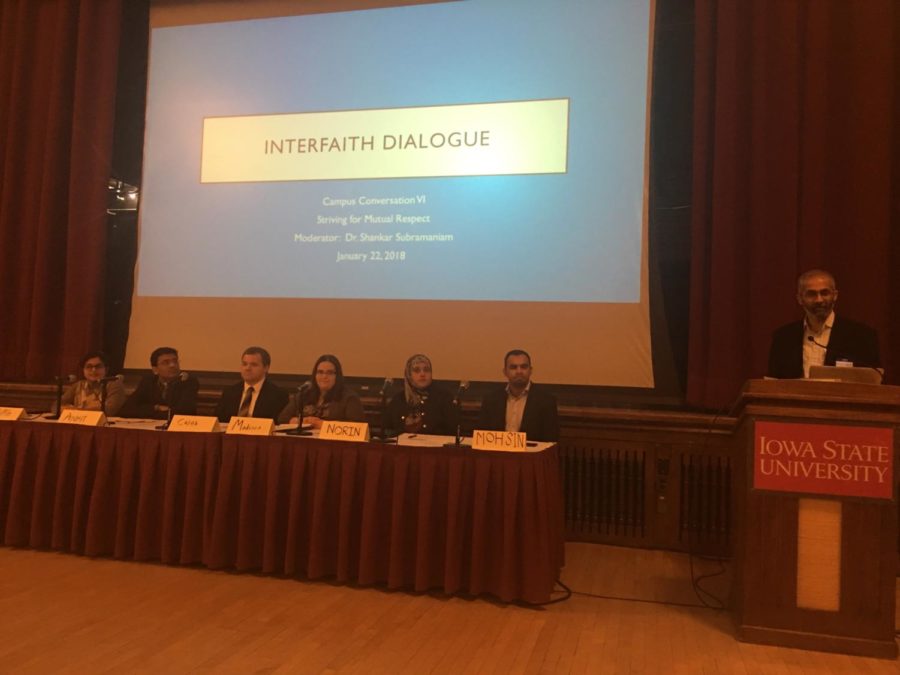Different Faiths Discuss How to Coexist in a Diverse World
From right to left: Moderator Shankar Subramaniam, Muhammad Mohsin Raza, Norin Yasin Chaudhry, Madison Smith, Caleb Lumley, Ankit Vats and Lalitha Dhulipala
January 23, 2018
Differences in religion and philosophy can often push people apart. This time it brought people together.
Around 60 ISU students and faculty gathered in the Memorial Union Great Hall Jan. 22 at 6 p.m. to listen and engage in philosophical religious discussions.
The event featured a panel that consisted of six members from four different student organizations, all of which were brought together by the Office for Diversity and Inclusion.
Mohsin Raza, graduate student in microbiology, and Norin Chaudhry, graduate student in biochemistry, represented the Pakistan-Student Association. They are the president and treasurer of the organization, respectively.
From the Hindu YUVA were President Lalitha Dhulipala, graduate student in electrical engineering, and member Ankit Vats, junior in aerospace engineering.
Atheist Agnostic Society President Caleb Lumley, senior mechanical engineering, represented a secular perspective. Also on the panel was Madison Smith, junior pre-business and president of the Orthodox Christian Fellowship.
The event opened with the panel addressing questions about stereotypes and stigmas, and compared themselves to other religions. Then the audience engaged in their own discussions before asking the panel questions of their own.
“It was great talking in small groups and learning about other religions,” said Michael Swanson, sophomore in accounting. “I learned a lot about atheism, you don’t really hear from that perspective when people talk about religion.”
The panel mostly focused on addressing stigmas and misunderstandings clouding perceptions about different faiths.
“People think [Christians] are not accepting of other faiths,” Smith said. “A lot of people assume I’m Jewish or Catholic when I say I’m Eastern Orthodox.”
Pakistan boasts the world’s second highest population of Muslims, directly behind Indonesia, so Raza and Chaudhry dispelled modern misconceptions of Islam.
“A lot of people think Islam involves extremism or terrorism… that it oppresses women… [and] promotes hating other religions,” Raza said. “That is simply not true.”
He continued by talking about how the media only focuses on Islam as a religion in times of distress.
“Bad things are happening all over the world, but whenever there’s Muslims involved they talk about our religion,” Raza said.
Lumley felt some people are misinformed about how non-belief works, and said people frequently ask atheists where they get their morals from without a God.
“I can’t necessarily speak for all atheists, a lot of atheists believe a lot of different things.” Lumley said. “The only thing we have in common is that none of us believe there is enough evidence to verify the existence of a god.”
Regarding morals, Lumley claimed atheists derive a sense of right and wrong “from the same place everyone else does: Empathy.”
“When people think of Hinduism, they picture millions of gods with funny faces,” Dhulipala explained. “It’s not that there’s many gods, it’s various ways to think about god… we believe that the God manifests himself in different forms.”
The audience talked shared their thoughts on diversity and religion with one another later in the night.
“In nature, diversity and commonality are inevitable,” said Raghunandan Iyer, graduate student in electrical engineering. “Understanding these concepts are innate to a peaceful society,”
Some audience members believed people sometimes think divisively, grouping people into ‘us and them’ categories.
“There’s a lot of focus on what your viewpoint isn’t and less focus on what it is,” said Jeff Kushkowski, reference librarian at ISU.
Kathy A. Parsons, head of space at Parks Library, agreed with Kushkowski.
“We don’t talk about community things enough, and we hyperfocus on what makes us different,” she added.
When the panel opened for audience questions, Iyer asked them if life could have meaning without religion.
“You don’t need religion to have a meaningful life,” Vats answered. “Religion can help someone find meaning, but it is not the only way,”
Lumley took things a step further and insisted that human perception of meaning is more of an illusion.
“Purpose and meaning do not exist apart from an intelligent mind establishing it… purpose only exists when intelligent beings impose it on something,” Lumley said. “Our lives don’t have to have meaning.”
Smith believes that each religion offers a variety of ways for each of its followers to find meaning in their lives.
“[Our religions are] a choice that we’ve all made… and you can interpret things in a lot of ways. I believe some things about my religion that my grandparents might not believe. It’s all based in how you individually think,” she stated.







